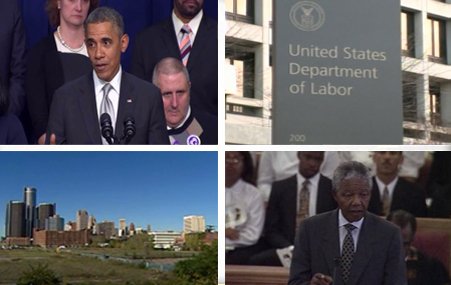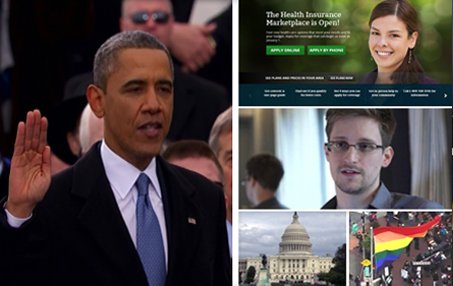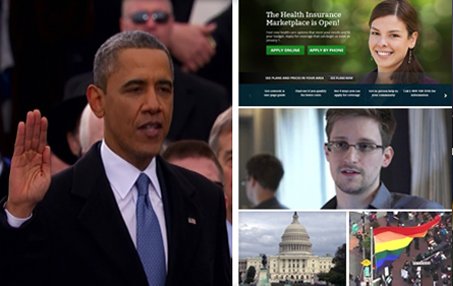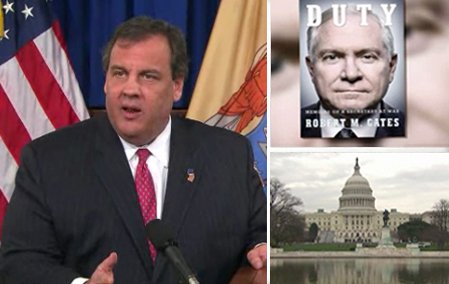GWEN IFILL:
How Washington learned to just get along and whether it can last. That’s tonight, on “Washington Week.”
SENATOR PATTY MURRAY (D-WA):
(From tape.) For far too long here in Washington, D.C., compromise has been considered a dirty word, especially when it comes to the federal budget.
REPRESENTATIVE PAUL RYAN (R-WI):
(From tape.) We knew that if we forced each other to compromise a core principle, we would get nowhere. That is why we decided to focus on where the common ground is.
MS. IFILL:
Hurray. No government shutdown. A deal is cut. But House Republican leaders are still angry at the tea-partiers who engineered the last shutdown.
REPRESENTATIVE JOHN BOEHNER (R-OH) [Speaker of the House]:
(From tape.) The day before the government reopened, one of the people of one of these groups stood up, and said, well, we never really thought it would work. Are you kidding me?
MS. IFILL:
And in the Senate, lawmakers are pulling all-nighters, fighting over White House nominees. Does this mean the White House is out of the woods on domestic policy? Polls say no, but foreign policy could end up being President Obama’s enduring legacy, at least John Kerry hopes so.
SECRETARY OF STATE JOHN KERRY:
(From tape.) The national security of the United States is stronger under this first step agreement than it was before.
MS. IFILL:
Covering the week, Molly Ball of the Atlantic, Jeanne Cummings of Bloomberg News, John Harwood of CNBC and the New York Times, and Doyle McManus of the Los Angeles Times.
ANNOUNCER:
Award-winning reporting and analysis, covering history as it happens, live from our nation’s capital this is “Washington Week with Gwen Ifill.”
(Station announcements.)
ANNOUNCER:
Once again, live from Washington, moderator Gwen Ifill.
MS. IFILL:
Good evening. Don’t get too excited, not yet, but Democrats and Republicans in Congress found something to agree about this week. Not health care, no, not that; nothing sweeping on taxes and spending, certainly not immigration. But they did agree that shutting down the government again because they couldn’t agree on anything would be a bad idea.
SENATOR HARRY REID (D-NV) [Senate Majority Leader]:
(From tape.) We didn’t get everything we wanted. Neither did they. That’s what we used to do. We would say, OK, I can’t get this so maybe we should work together. And that’s what we did.
REP. RYAN:
(From tape.) And I know it’s a slightly partisan thing to say to really do what we think needs to be done, we’re going to have to win some elections. And, in the meantime, let’s try and make this divided government work.
MS. IFILL:
But the outlines of the debate also foreshadowed fights to come, perhaps in the Senate.
SENATOR ROGER WICKER (R-MS):
(From tape.) I will stand before this body tonight and say that I cannot vote and will not vote for this budget.
MS. IFILL:
He talks about this budget. First-off, Molly, what was in this budget? What did the House accomplish and what didn’t they accomplish?
MOLLY BALL:
Well, in a way, this is a small deal. If funds the government for only a little more than a year, through March 2015. It sets spending levels a little bit above $1 trillion. It restores a lot of those dreaded sequestration cuts that neither party really liked, restores some of the defense spending cut by sequestration, restores some of the discretionary spending cut by sequestration. It does not extend unemployment benefits, which Democrats really wanted. And since it sets spending higher than sequestration, it doesn’t cut as much spending as Republicans would like. And it doesn’t do any long-term changes to things like entitlement or tax reform that would have been part of the imaginary grand bargain that everybody has always been chasing.
MS. IFILL:
So a refresher for those of us who last paid attention when the government was shut down and we couldn’t agree on a budget, Jeanne. What was different this time that allowed them to agree? Why wasn’t the tea party able to stop it this time?
JEANNE CUMMINGS:
Somewhere around an 8 percent popularity rating, that’s how low the Republicans went. John Boehner gave them their moment. And they saw what became of it, and that was a very important lesson for the House Republican Caucus. Many of them walked out of that saying, never again, or at least not in an election year. And so the whole point of this bargain is to push everything past next year’s midterm elections so that the Republicans can now focus on just – in their minds, just attacking health care because they believe that that will be an issue that will work for them.
MS. IFILL:
Was this a victory for Patty Murray, for Paul Ryan, or for John Boehner himself?
MS. CUMMINGS:
I don’t think it was a victory necessarily for Boehner. Boehner had – any bipartisan deal has eluded him for years. Ryan got a deal. But it’s a double-edged sword for Ryan. Inside the House, his stock went up; in Iowa, maybe not so much. So it depends on what his ambitions are.
MS. IFILL:
Molly, what do you think about that?
MS. BALL:
I think Boehner actually is quite strengthened by this deal because that clip that you saw at the top of the show where Boehner really went off on these outside groups, who a lot of Republicans, even conservatives in the House really feel that they’ve been playing them like pawns in a game, that these groups command the Republicans to vote in a certain way, threaten them with primaries if they don’t exactly toe this line, and then sort of throw up their hands when it doesn’t work out and the government shuts down and their popularity ratings plummet.
So this was Boehner wresting back control, saying, you are not going to be the boss of me or of us. We are the lawmakers here. We are running the House of Representatives. And it happened. He got almost three-quarters of the House Republican Caucus went along with him.
Now, the tea party may have the last laugh if they can make good on their threat and they really can throw a lot of these people out in primaries, but it’s going to be hard for them to primary 169 Republican members of Congress.
JOHN HARWOOD:
Jeanne, help me understand one thing. We’re used to seeing the Senate be able to accomplish things, like on immigration, sometimes in a sort of bipartisan way, then it gets stopped in the House by ideology. Here you had 300 votes – more than 300 votes for this deal in the House, including a large majority of the Republican Caucus. And yet, you’ve got people like Roger Wicker in that clip that we just saw, and there has been some nervousness at the end of the week about, yeah, we’re probably going to get it in the Senate but not assured. What’s the problem?
MS. CUMMINGS:
Well, Molly touched on it, and it’s the primaries. The senators are far more vulnerable to actually losing their seats when they get primaried by the tea party. And as of right now, seven of the 12 Republican senators who are seeking reelection have tea party primary challenges.
MR. HARWOOD:
Including Mitch McConnell.
MS. CUMMINGS:
Including – yes, the minority leader. And so to them, the threat from the tea party groups to put money into their races and to come after them is much more vivid than it is necessarily for the House members.
If you look at Texas, where Senator Cornyn is facing Steve Stockman, a House member who’s very much a tea party person, and most people thought, well, you know, Cornyn is very well established, he’s a member of the leadership, but you must remember that it was in Texas that Ted Cruz took out the establishment candidate, so strange things can happen. So there is palpable nervousness, and it would be interesting to see how many of those 2014 challenges senators actually vote no in order to avoid stirring up more trouble.
MS. BALL:
I would just add that there’s another subplot going on in the Senate right now, which is that they are in 24-hour session, thanks to Harry Reid keeping them up all night, to get these appointments through. Harry Reid’s use of the nuclear option has ruptured a lot of whatever bipartisan comity previously existed in the Senate.
MR. HARWOOD:
How much was there? (Laughter.)
MS. BALL:
It wasn’t that much. (Laughter.) There’s exactly an inch of bipartisan comity in the Senate, an inch more than the House.
MS. IFILL:
Except that the – well, we called it the nuclear option and it sounded so tremendous and now it’s kind of more of a whimper than a bang.
MS. BALL:
The majority rules.
MS. IFILL:
Majority rules, and these judges and administration appointees are being confirmed pretty routinely, even though they’re doing it dramatically around the clock.
DOYLE MCMANUS:
Now, we’ve been talking about the Republicans because they’ve been so exotic this year. What happened on the Democratic side on the House? There was a threat there that a lot of Democrats who hated this bill as much as a lot of those Republicans were going to take a walk.
MS. BALL:
The word that Nancy Pelosi used, the phrase that Nancy Pelosi used was she told her caucus to embrace the suck.
MR. HARWOOD:
Suck. Can you say that on TV?
MS. BALL:
Which she then refused to – well, Nancy Pelosi would not repeat it in a television interview. She would knowledge that she said it privately.
MS. IFILL:
Wise. Wise. Yeah.
MS. BALL:
She’s had her face in a few commercials over the years. But, you know, Democrats are not thrilled about this. And I think that is a sign that both sides got about as much as they could out of this deal that there is unhappiness on both sides. It’s mostly the failure to extend unemployment insurance the Democrats are mad about. And they say they are still going to fight on that in January.
MS. CUMMINGS:
And that’s the other thing. The Democrats take that issue into the campaign year. And that’s not necessarily a bad issue for them to take in into a political season in which the last cycle – what was the message? That they only care about rich people. And so now the Democrats can take that back into the 2014 midterms.
MR. MCMANUS:
Well, I guess that’s what I wanted to ask: if you get that into January, OK, a million people will have lost their unemployment. Do the Democrats have enough leverage to really make a fight at that point on unemployment insurance?
MS. CUMMINGS:
They can’t win it. They have a campaign issue. And the Democrats also, like the Republicans, have got to now focus on health care because they believe – some, Senator Reid in particular – that they can make it an asset if they can make it work, and if they can get their messaging right. And the Republicans are hoping for the third straight cycle that this becomes their issue, this is their ace in the hole. So I think we will now finally settle the fight.
MS. IFILL:
Isn’t there also another thing looming, and that’s that debt ceiling fight. It’s not over. They settled this small problem with the small deal, but there’s kind of a bigger issue, that rock at the top of the hill.
MS. BALL:
That’s right. This deal does not raise the debt ceiling. And that is going to come, I believe in late February or early March that the debt ceiling will be hit again, and there will have to be some kind of arrangement to raise the debt ceiling. Republicans have historically used this for leverage. The administration’s line and Harry Reid’s line has been that there is no negotiating around the full faith and credit of the United States. We’ll see if they stick to that again. We’ll see if Republicans feel about the chance of default the way they do about the chance of shutdown.
MR. HARWOOD:
Jeanne, given the fact that – on Doyle’s question – a much higher proportion of Democrats supported this deal than Republicans, even though it didn’t have the unemployment benefits. Is it fair to look at John Boehner and Nancy Pelosi and say, one leader has control over her caucus
and can deliver the votes and one is struggling to do that?
MS. CUMMINGS:
Well, that has certainly been the case for years.
MS. IFILL:
Except he delivered the votes this time, didn’t he?
MS. CUMMINGS:
He did this time and that’s the difference.
MR. HARWOOD:
He did, but not in as high proportion as Pelosi did.
MS. CUMMINGS:
But Pelosi has had –
MS. IFILL:
Very good.
MS. CUMMINGS:
– is a very good leader of her caucus. There is no question about it.
But getting back to the debt ceiling, one thing to bear in mind if that fight comes and we see the same kind of brinksmanship over a national default, that is the rupture that occurred between the business community and Republicans. And so that’s what has sent the U.S. Chamber into these primaries to try to square off against the tea party. The Chamber and the business community didn’t get in because of the shutdown, although that was irritating and they didn’t like it. It was when you had some members of the House saying, well, let’s default; I don’t think it’s going to be a problem. Let’s just give it a shot. That’s what drove the business groups crazy, and so it will be interesting if that fight comes again or not.
MS. IFILL:
And it’s too soon for either Democrats or the business-minded Republicans to say that the tea party has been de-fanged as a result of this.
MS. BALL:
Absolutely. I think the tea party has seen that they now have to take this fight to the primaries. And I don’t think we know – you know, the tea party played really big in 2010. It’s easier for them to play in a midterm, where turnout is lower and it’s a more Republican electorate, but, you know, notably elevated a lot of candidates in primaries who then lost general elections.
The tea party really has a lot of clout in the House, where a lot of those people got elected and are still there, and in the Senate, where people like Ted Cruz were elevated in those primaries. But they didn’t have as much success in 2012, and they’re really going to have a fight on their hands this time, where, as Jeanne said, the Chamber of Commerce and other sort of pillars of the Republican establishment have really taken it upon themselves to fight back.
MS. CUMMINGS:
Just one quick note. Bloomberg had a poll this week and we asked what people thought of the Chamber getting into the primaries. And a majority, 61 percent, said not a good idea, not good for them to intervene. It was a majority of independents, Democrats and Republicans. So we’ll see how much clout the Chamber brings to these fights as well.
MS. IFILL:
Well, as all these fights are going on within the Republican Party, you would think the president would be kind of happy about this, right? So let’s see how he is taking all this.
On balance, you see it wasn’t a bad week. He was cheered in South Africa as he delivered a moving eulogy to Nelson Mandela. And people are finally, slowly signing up for the health care. But a new poll shows his political standing has taken a serious, perhaps permanent hit as he struggles toward the middle of his second term. John Hardwood has the numbers. What are they?
MR. HARWOOD:
Well, first of all, let me talk about, before going into those numbers, some of the good things that happened. You mentioned the Mandela funeral – that was a good moment for the president.
I do think this deal has very important political benefits for President Obama, this budget deal that we’ve been talking about. And the reason is the Congress has been actively harming the economy by the brinksmanship, by the government shutdown, by the problem with the debt ceiling. I think the debt ceiling is likely to get raised without incident. And so, for the president to be able to get to the end of the week and say, we’ve got a truce on the budget, the fact that the economy is not getting pummeled by the Capitol, that’s a good thing for the president.
Now, we had a poll this week that sort of took stock of the effect of the end-of-year troubles the president had on health care. There’s very serious fallout for him. His poll approval rating ticked up just one point since the poll about a month ago, at the height of the struggles over health care, but he’s still got 54 percent of the people, the highest we’ve ever shown in our poll, disapproving with his performance.
And, more importantly, you see not only on job performance, but on his personal characteristics he’s taking a hit. The majority of the American people still like the president. That’s good. But it’s a smaller majority, and when you get to specific characteristics like, is he honest and straightforward, only 37 percent of the people in our poll gave him high marks on that.
MS. IFILL:
So his credibility took a hit.
MR. HARWOOD:
That is a debilitating thing. You know, the PolitiFact, the website capped the week by declaring the – if you like your health care plan, you can keep it the lie of the year. Well, that is a small emblem of what’s happened to this poll numbers. People saw a very high-profile thing that he said, concluded that it wasn’t true.
Now, is it permanent? I don’t think anything is permanent in our politics right now. So I think it is certainly possible, now that the website is on stronger footing; they’ve got a lot of work to do to get the exchanges healthy by getting the people they need to make that financially viable, the right mix of people. And it’s of paramount importance, I think, for the administration, by the end of this month, to get all the people whose plans were cancelled who want to buy coverage, get them coverage so that nobody can say, because of “Obamacare,” the number of people without insurance has gone up because they weren’t able to buy coverage.
MR. MCMANUS:
John, let me go back to that question you posed, is it permanent or is it just transient. I mean, we’ve got cases of presidents who had terrible bumps in their second term – Ronald Reagan, Bill Clinton – and recovered and finished beautifully. And we have a recent example, George W. Bush, of a guy who hit a bunch of bumps and just kept heading down. Are there any clues in that history as to which kind of problem this is?
MR. HARWOOD:
Well, I don’t think – based on what we know now, you shouldn’t expect him to follow a Bush pattern of continuing to go down. Think about the succession of blows the president had: an Iraq war that was going very badly.
MR. MCMANUS:
President Bush. Yeah.
MR. HARWOOD:
President Bush. He had Hurricane Katrina which caused peopled to say, wait, maybe he’s not competent at all. And then you had a recession and financial crisis after that. That was a tremendous set of blows the president had. I think this president has a growing economy. He has an improving job market. And so if he can get the health care system figured out so that the enrolment process is smooth enough that people don’t look at the government and say, they’ve screwed this up, I think he’s got a chance at a recovery.
MS. CUMMINGS:
Will they believe in him again? Can he – can he win back their trust?
MS. IFILL:
Yeah. How do you do that exactly?
MR. HARWOOD:
Well, I don’t think – no.
MS. CUMMINGS:
Is it competence? If he’s just competent will it add to it? How does he do that?
MR. HARWOOD:
I don’t think you can fully recover from a blow like this. Remember, the president’s the most well-known figure in the country. And so if people reach a decision about his credibility on an important issue and find it wanting, that’s not a casual judgment. That’s a big deal. And so I think it’s hard – he won’t get back to the levels that he was, but I think the better off the country feels it is, the less consequential that loss of confidence in his credibility will be.
MS. BALL:
Now, of course, no matter how bad things get for President Obama, he doesn’t have to face the voters again. He’s not going to be on the ballot, especially in the midterm next year. Do we have a sense of how much of this damage is accruing also to Democrats, to Democrats in Congress, to the Democratic brand, to all the vulnerable Democrats especially in red states?
MR. HARWOOD:
We know it’s bad for members of the president’s party when his approval rating is lower. But we have seen some president get hammered in midterms even with high approval ratings.
The best thing the president and Democrats have going for them is the small number of competitive seats. You only have six percent of the seats in this election coming up that has split their tickets in presidential and House races recently, so the downside for Democrats is limited by that fact, as is the upside.
MS. IFILL:
Thanks, John.
Now we’ll move to Secretary of State John Kerry who’s been bouncing to and fro, from Israel to Geneva to Vienna to Asia. He stopped in Washington long enough this week to win a small concession in Congress: it will not impose additional sanctions on Iran for now. This was the secretary’s appeal.
SEC. KERRY:
(From tape.) We’re asking you to give our negotiators and our experts the time and the space to do their jobs. And that includes asking you while we negotiate that you hold off imposing new sanctions. Now, I’m not saying never. I’m just saying not right now.
MS. IFILL:
But that is just a portion of the meal on Kerry’s plate these days. There’s also Israeli-Palestinian peace talks, the civil war in Syria, the long-ignored Asia pivot. It’s not the first time a second term president has refocused on foreign policy. So what of all those things are the priorities, Doyle?
MR. MCMANUS:
You know, I think you kind of listed all of them.
MS. IFILL:
Yeah.
MR. MCMANUS:
And it’s hard to say, well, these are priorities and these aren’t. Now, there’s an interesting contrast here. Around the White House, President Obama, Susan Rice, the national security adviser, want to focus on Asia. It’s the issue of the future. They want to get out of those old insoluble issues in the Middle East. The secretary of state often has a peculiar problem in an administration: how can he or she find an issue to grab and make his or her own, because the White House wants to take the good ones.
So John Kerry has done something really quite audacious and unusual in a sense. He’s taken all the bad issues. He’s taken the insoluble, terrible old ones – Iran, Israel, Palestinian negotiations. There’s a no-win situation for a long time. And, maybe worst of all, the Syrian civil war. And he is throwing himself into these things. Just at the end of this week, he made his ninth visit to Israel to try and get those peace negotiations on track. And he’s really going to try and make his mark.
And part of the key here in the kind of bureaucratic politics is the White House is very happy to have John Kerry taking on all these really nasty issues.
MS. IFILL:
Well, that was – I guess that’s the question. Where is the White House in this? Are they saying, go ahead, buddy, do what you need to do and call us if you make any progress?
MR. MCMANUS:
That’s exactly right. I mean, the classic case here is if one of these plans succeed, it will be called the Obama plan, and if it fails, it will be called the Kerry plan. Every secretary of state has told a version of that joke at one point or another.
MR. HARWOOD:
Is it fair for people to draw the conclusion that some have, Hillary Clinton, political, playing it safe as secretary of state, didn’t do all that much; John Kerry, bold, taking risks kind of secretary of state who gets things done?
MR. MCMANUS:
It’s not entirely fair because, for example, the Iranian nuclear negotiations weren’t ready and you needed a new president in Iran for that to go forward, but it’s not entirely unfair either.
Look, here, inside the State Department, Hillary Clinton was seen as a little bit risk adverse and she subcontracted some of these issues to other people. Remember, Israel and the Palestinians wanted George Mitchell. Afghanistan went to the late Richard Holbrooke.
The difference here is that John Kerry knows that this is his, almost certainly his last big job in American politics. He had his 70th birthday this week, incidentally. So, in a way, he has nothing to lose. And this next three years is his chance to make his mark. And he says in speech he’s willing to go out and take risks. He’s willing to risk getting knocked down if he thinks he might have a chance to getting something done.
MS. CUMMINGS:
Doyle, it seems to me that this started – you know, it seems months ago with the Syria – the war in Syria, and whether we were going to engage, and whether we were going to attack them. And now, you don’t hear much about that at all. What –
MR. MCMANUS:
But you will again soon because that same John Kerry, believe it or not, has been spending months putting together a peace conference in Geneva, in January, and he’s going to try and get the two sides together. Now, does this thing have a chance of really working?
MS. IFILL:
Especially since the U.S. this week decided that maybe it was going to pull out some of its support for the moderate forces it was hoping they would overthrow Assad?
MR. MCMANUS:
Well, the moderate forces that the United States has been supporting are in disarray would be a polite word for what they’re in. No. This is about the most unpromising – but this is almost the quintessence of the Kerry doctrine. This one is a complete loser. Nobody thinks it’s going to succeed and he’s going to go ahead and open the conference anyway.
MS. BALL:
Well, he’s got so many balls in the air, Doyle. He’s got this whole laundry list that you talked about. And, as you said, he’s not, like Secretary Clinton did, delegating a lot of this stuff. Is it possible that he’s bitten off a lot more than he can chew?
MR. MCMANUS:
Sure. That’s actually – that’s a concern of a lot of the professionals in that – actually even the guy who is his own Middle East negotiator, Martin Indyk, before he went to the job, I’m told, Martin Indyk said to people, you know, he’s probably bitten off more than he can chew. This may be – this may be too far.
MS. IFILL:
Martin Indyk, who was there when it all fell apart before and who knows of which he speaks.
MR. MCMANUS:
I went – I did a column on Kerry, and I asked, gee, you know, clearly, he can’t spend much time on Asia, which the president is really interested in. They said, no, no, no. He’s in Asia this week. So he’s trying to do just about everything.
MS. IFILL:
He’s in Vietnam tonight.
MR. MCMANUS:
He’s in Vietnam right now.
MS. IFILL:
Exactly. Well, I guess he’s going to figure something out, but, at the very least, he’s going to come out of this with a reputation for John Kerry. We’ll be watching all of that. Thank you, everyone.
This conversation has to end but another one begins shortly on the “Washington Week Webcast Extra.” The streams live at 8:30 p.m. Eastern Time or you can catch it all weekend long, all week long as a matter of fact, at pbs.org/washingtonweek.
Also online you can find my take on the week in handshakes, selfies (sp), and fake sign language, and how it overshadowed the coverage of the Mandela memorial.
Keep up with daily developments now seven days a week on the PBS “NewsHour.” And we’ll see you right here next week, on “Washington Week.” Good night.








































